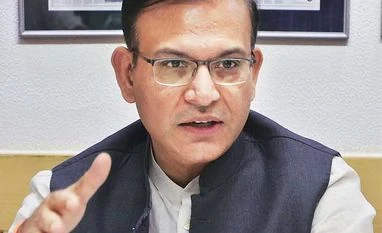The Finance Ministry on Tuesday said the Reserve Bank of India’s (RBI) move to cut the policy rate by 25 basis points and boost liquidity in the system will provide a "good stimulus" to the economy and encourage banks to reduce lending rates. One basis point is one-hundredth of a percentage point.
"RBI actions today are very welcome. Obviously we believe that the rate cut which has been effective would be very good stimulus for the economy," Minister of State for Finance Jayant Sinha said.
The RBI, in its first bi-monthly monetary policy review for FY2017, cut the repo rate by 0.25% and introduced a host of measures to accelerate liquidity so that banks can lend to productive sectors and indicated an accommodative stance going forward.
"Some of the banks have already reset their interest rates taking into account the marginal cost of lending and done some amount of reduction of rates consequent to all these measures and consequent to RBI's announcement today the banks will perhaps need to do some more transmission of reduction of policy rates of RBI," Economic Affairs Secretary Shaktikanta Das said.
RBI Governor Raghuram Rajan, while unveiling the policy, said that banks have already cut interest rates by 25-50 basis points on account of the shift to Marginal Cost of Lending Rate (MCLR) and expressed hoped they would effect more cuts following the policy announcement. “Now that we have given them more liquidity, banks can transmit more,” he said.
Sinha said the Budget has taken various fiscal and reform initiative, creating space for monetary easing.
"In coordination with RBI we really have to amplify both fiscal initiative and monetary initiative that are now in the pipeline. That really is what we are working in right now as we do so we will provide the boost to the economy," he said.
Das said India needs to become a low-cost economy both in interest rates and in other transactional costs.
"We have already highlighted that the introduction of GST will significantly bring down transaction cost and the cost of manufacturing. We are also looking at low interest rate regime so that there is more investment, in manufacturing, infrastructure," he said.
Das said that the government has been taking several measures to facilitate private sector investment and has announced steps towards simplification of procedures with regard to FDI reforms.
"The effort of the government is to provide a policy framework where private sector investment will pick up. Substantial outlay for agricultural sector, we do hope, will add to the rural demand which accounts for the considerable portion of our domestic demand. With a good monsoon hopefully this year I think there should be a revival of domestic demand also," he said.
"RBI actions today are very welcome. Obviously we believe that the rate cut which has been effective would be very good stimulus for the economy," Minister of State for Finance Jayant Sinha said.
The RBI, in its first bi-monthly monetary policy review for FY2017, cut the repo rate by 0.25% and introduced a host of measures to accelerate liquidity so that banks can lend to productive sectors and indicated an accommodative stance going forward.
Also Read
RBI Governor Raghuram Rajan, while unveiling the policy, said that banks have already cut interest rates by 25-50 basis points on account of the shift to Marginal Cost of Lending Rate (MCLR) and expressed hoped they would effect more cuts following the policy announcement. “Now that we have given them more liquidity, banks can transmit more,” he said.
Sinha said the Budget has taken various fiscal and reform initiative, creating space for monetary easing.
"In coordination with RBI we really have to amplify both fiscal initiative and monetary initiative that are now in the pipeline. That really is what we are working in right now as we do so we will provide the boost to the economy," he said.
Das said India needs to become a low-cost economy both in interest rates and in other transactional costs.
"We have already highlighted that the introduction of GST will significantly bring down transaction cost and the cost of manufacturing. We are also looking at low interest rate regime so that there is more investment, in manufacturing, infrastructure," he said.
Das said that the government has been taking several measures to facilitate private sector investment and has announced steps towards simplification of procedures with regard to FDI reforms.
"The effort of the government is to provide a policy framework where private sector investment will pick up. Substantial outlay for agricultural sector, we do hope, will add to the rural demand which accounts for the considerable portion of our domestic demand. With a good monsoon hopefully this year I think there should be a revival of domestic demand also," he said.
)